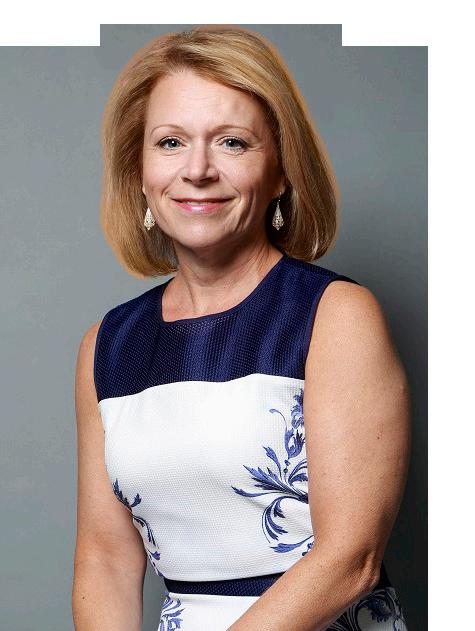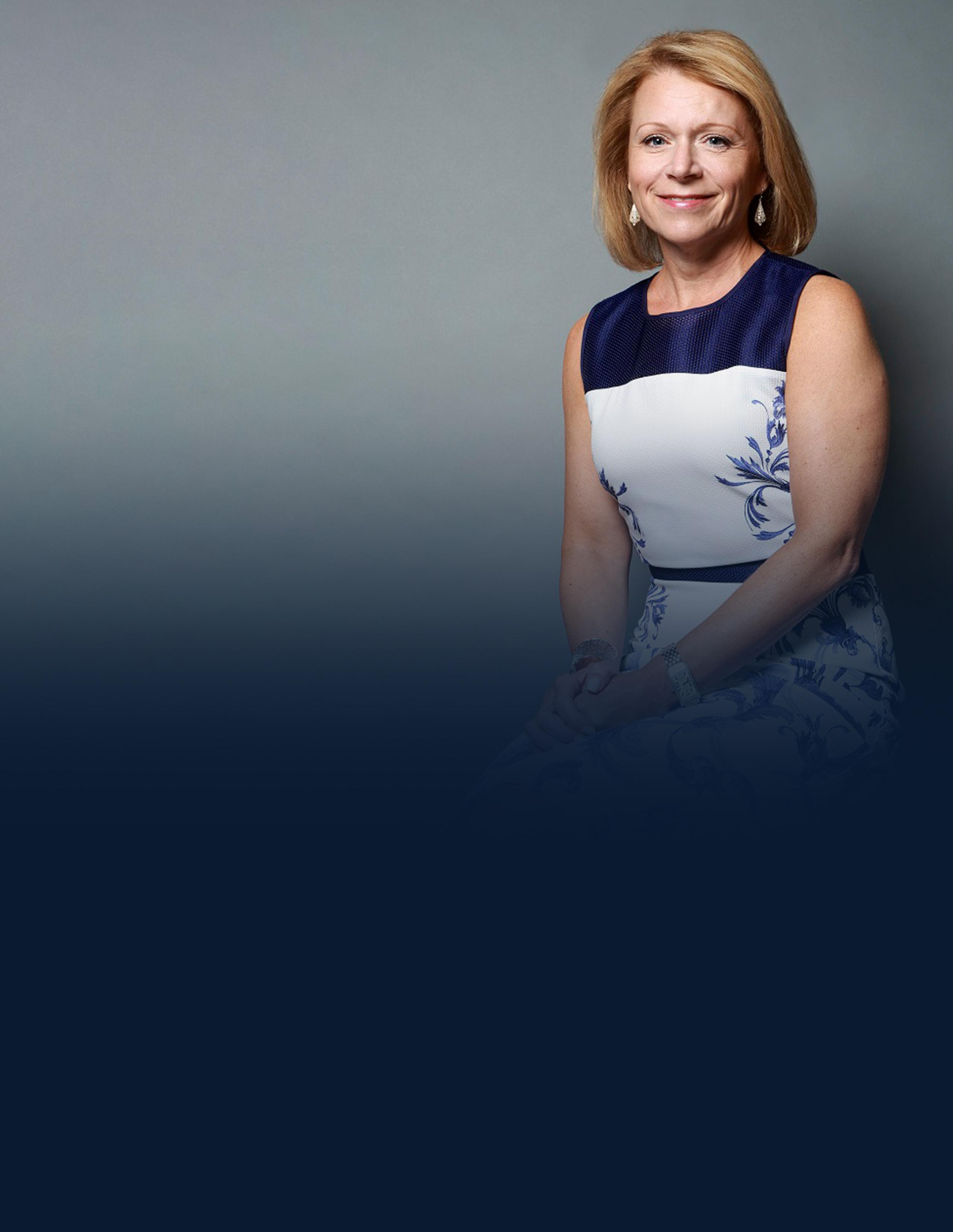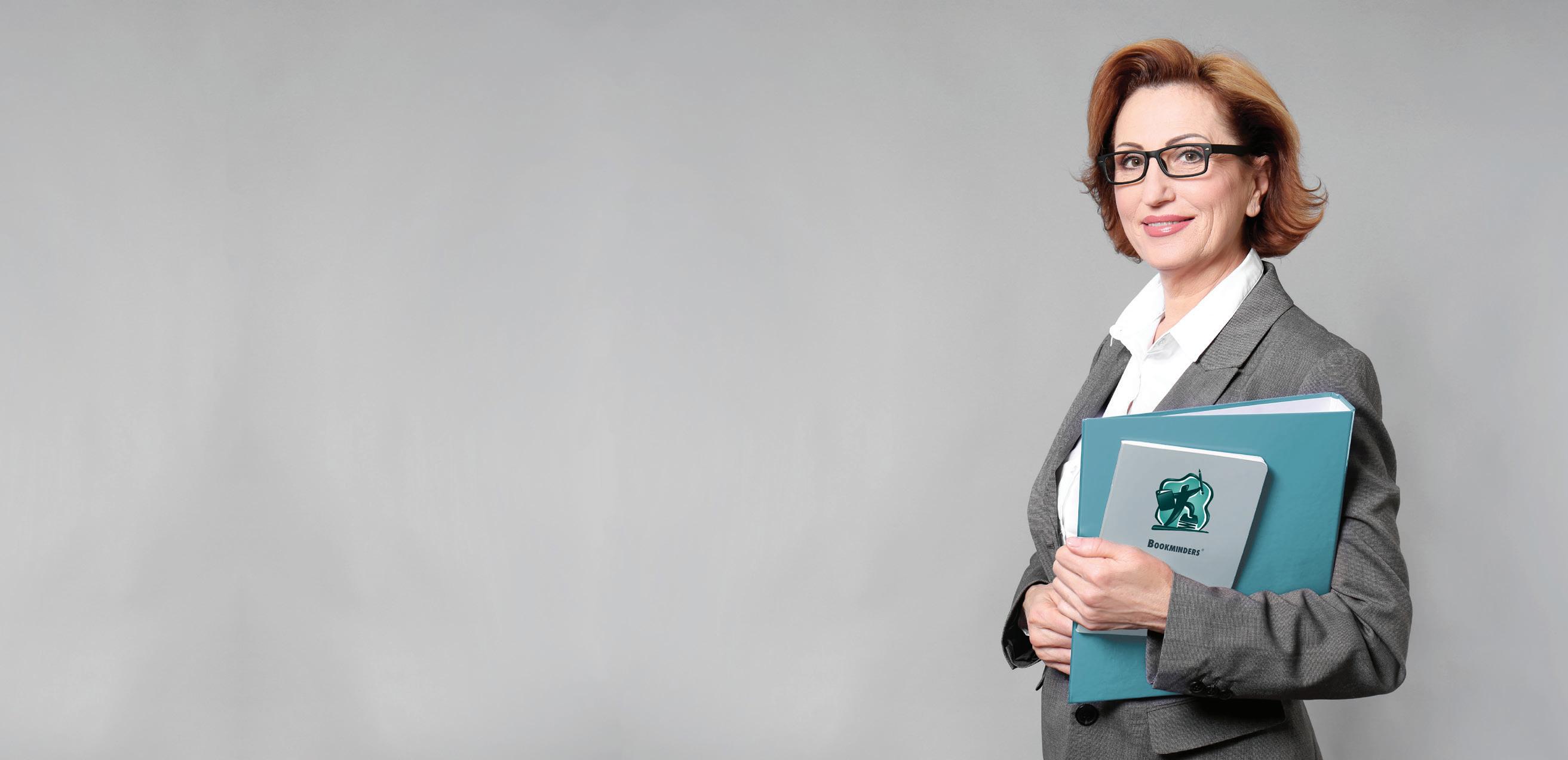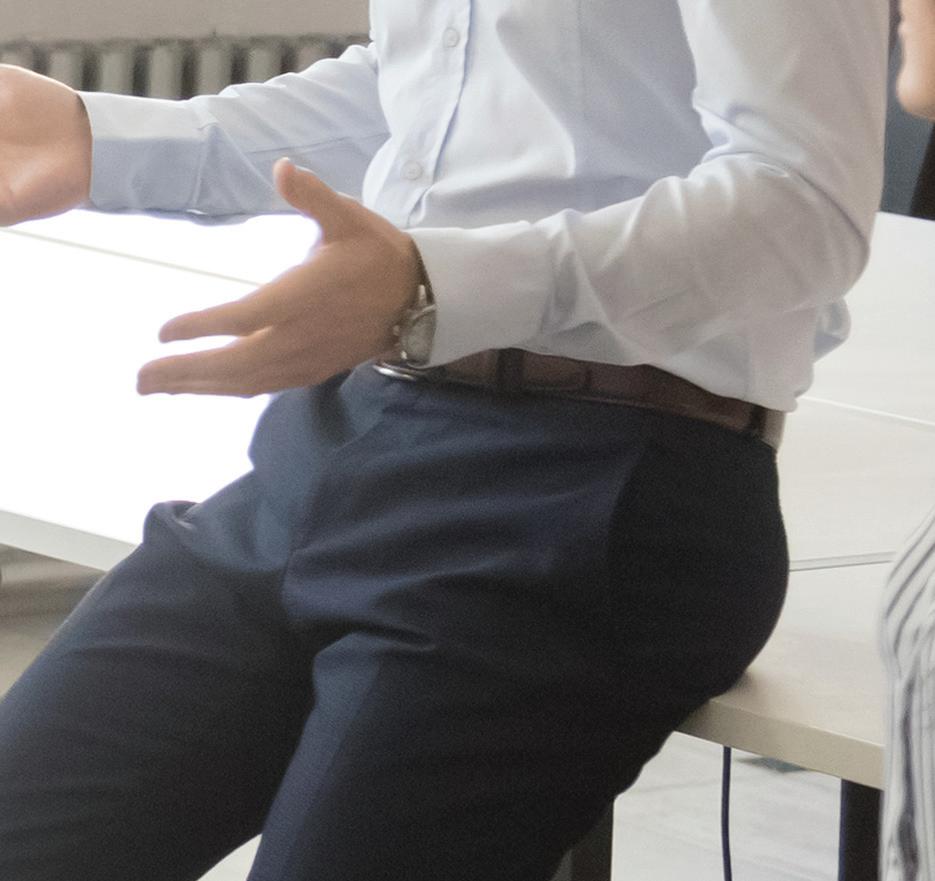
12 minute read
‘Together, we’re stronger’

Community, inclusion top the agenda for 2021-22 MACPA Board Chair Lexy Kessler
BY BILL SHERIDAN, CAE
There’s no shortage of issues awaiting Lexy Kessler’s attention as she begins her term as chair of the Maryland Association of CPAs’ Board of Directors. There is, of course, the ever-present pandemic and all of the changes it has brought to the profession. Beyond that, though, lie a host of challenges that are impacting CPAs in Maryland and beyond. • The pipeline: The National Association of State Boards of
Accountancy reports that the number of CPA exam sections taken has dropped from 310,000 in 2016 to 248,000 in 2019.
In addition, the number of new CPA candidates fell from 48,000 in 2016 to fewer than 37,000 in 2018. And the number of candidates who passed their fourth section of the CPA exam dropped from about 28,000 in 2016 to less than 24,000 in 2018. The bottom line: Just one in three accounting graduates now actually becomes a CPA. That doesn’t bode well for the
CPA profession, or for the organizations that are looking to hire new CPAs. • Diversity and inclusion: As of 2016, just 1 percent of CPAs employed by public accounting firms were black. And 0.3 percent of partners at those firms were black. This in a country in which roughly 13 percent of the population is black.
Moreover, according to McKinsey’s “Women in the Workforce 2020” report: “Women — especially women of color — are more likely to have been laid off or furloughed during the
COVID-19 crisis, stalling their careers and jeopardizing their
financial security. … As a result of these dynamics, more than one in four women are contemplating what many would have considered unthinkable just six months ago: downshifting their careers or leaving the workforce completely. This is an emergency for corporate America.” • The future of the MACPA: Longtime Executive Director
Tom Hood left the MACPA in February to take a job as the executive vice president of business growth and engagement for the Association of International Certified Professional
Accountants. At the same time, the Association acquired the
MACPA’s training affiliate, the Business Learning Institute.
The moves present both challenges and opportunities for the association moving forward. With all of that in mind, it’s time to take stock of Kessler’s mindset as the MACPA enters the next phase in its evolution. “The MACPA has been at the forefront of what we call the futureready movement,” Kessler said. “That's what has allowed the organization to get through all of these changes as well as it did. Sooner than other organizations, we’re pivoting and looking at ‘MACPA 3.0’ now. What are the things that we need to be doing going forward? What do our members need? What do our communities need? That’s the future of our profession.” With those issues at the forefront, MACPA Editor Bill Sheridan sat down with Lexy recently to talk about her priorities for the coming year, and how the MACPA can take the next step toward futurereadiness — both for itself and its members.
Here’s what she had to say. Bill Sheridan: Where are you from originally? Lexy Kessler: I was born in Texas, moved around a bit with my dad's different jobs and settled in Maryland, in Rockville, Md., when I was in elementary school. I’m not quite a native of D.C., but pretty close by D.C. definitions. BS: What did your dad do? LK: He's a retired nuclear engineer. He worked with the Nuclear Regulatory Commission for most of his career. BS: Do you have brothers and sisters? LK: One brother. He lives in Colorado Springs, and I have a niece and nephew as well. BS: And your family? LK: I have a wonderful husband. We've been married for 33 years and have two children. One is 29; she lives in New York City and works on Wall Street. She's doing great. My son is following in my accounting footsteps. He's 26 and is working for a consulting firm in Washington, D.C. BS: Why accounting for you? What drew you to the profession? LK: It seemed logical and orderly, and I was good at math. That's what most people say. But there was something about it that came naturally to me, and I enjoyed it. So I started taking more classes. I took my first accounting class in high school. I feel like we need to start teaching more people when they’re younger and earlier in their careers, because that's what hooked me into it. It was a class in high school. BS: Right before the MACPA’s last chair, Avonette Blanding, took office, a pandemic broke out. Then halfway through her term, Tom Hood left as MACPA CEO and took the Business Learning Institute with him. So, I'm wondering, what are you going to do to make sure that we don't have that kind of year again? I'm kidding, obviously. I kid Avonette because I love her. She was an extraordinary chair. But we're still dealing with COVID. Things are looking up now, but there's still a lot of work to do in terms of coming out of this pandemic stronger. And we're in the middle of re-imagining the MACPA in the post-Tom Hood era. What are you seeing as your priorities — or really, as our priorities — as you get started? LK: The MACPA has been at the forefront — and hopefully always will — of what we call future-readiness. That has allowed the organization to get through everything as well as we did. Sooner than many other organizations, we are now able to pivot and actually look at “MACPA 3.0” now. What are the things that we need to be doing going forward? What will our members need? How do we reimagine our communities of members? I believe we’re talking about the future of our profession in many ways. We need to focus on building that pipeline, because that will be critical. We have a lot of people who are retiring. How we do business is changing. We won't see those effects tomorrow, but we will absolutely will see them in the next five to 10 years. In order to support an “MACPA 3.0,” we must work on building a strong pipeline for the future.

BS: You're calling this not MACPA 2.0, but MACPA 3.0. Why that jump?
Bookminders ®
Recommended by CPAs

443-759-3310 www.bookminders.com

– Lexy Kessler, MACPA Board Chair
LK: You always hear people talking about version 2.0. I feel like even before I became active with the MACPA, they were already looking at version 2.0 with our focus on being future-ready, with looking at anticipated disruptors and anticipating change. The MACPA was already doing that. So now, we’re on to version 3.0. What are the things from version 2.0 of the MACPA that will help us create that next generation, and the next association after that for our membership? BS: Where does the association go from here? How are you imagining our role going forward? LK: We have an opportunity for everybody to do new and exciting things for the profession. The entire MACPA team got the association through the past year. It wasn’t one individual — a team did that. Now, being able to take the organization to the next level is exciting. It's energizing. It's motivating. There are opportunities for growth for every single person in the organization. The MACPA has been at the forefront of our profession nationally. Getting to the top is one thing, but staying at the top is another. We have an opportunity to continue to be relevant on a national stage, to continue to be leaders among state CPA societies. And that opportunity exists for every single person in the organization. BS: And Tom hasn’t really left. He's still a member of the MACPA. He still lives in Baltimore. He's right here, he’s still involved in the association, and we continue to see him every now and then. And that's good, because being exposed to his future-focus and his optimism, quite frankly, is infectious. LK: There's no question. Tom has been a great leader, and great leaders help others become great leaders as well. That's what's happened here. We have other leaders in the community who are still with MACPA. BS: Moving on a little bit to the profession at large: What kind of opportunities do you think might have surfaced for CPAs over the past year and a half or so as we've dealt with this crisis? LK: I think our profession is being redefined, and it's kind of a kick in the pants into the future. What’s happened is something we've been talking about for a long time. The (Paycheck Protection Program) loan process is an example. Who did the business community turn to? They turned to their CPAs for help. They didn't turn to any other profession. We became advisors overnight in a much more visible, more impactful way. We’re impactful in how we advise our clients anyway, but I think the broader business community has seen that during the pandemic. That's ours to run with right now. We’ll continue to build out advisory. We’ll continue to educate others about what we can do as a profession and how we can help businesses. Compliance is absolutely a big piece of it — the financial statements, the tax returns from a public accounting perspective. The impact that a CPA has on organizations is very visible right now, and it's ours to run with. BS: It seems as if there's also been a re-emphasis on the importance of the concept of association — of relationships and leaning on other people to help us do what we need to do, and on the importance of diversity, equity, and inclusion. In that context, how has the MACPA’s role evolved over the past 18 months? LK: The MACPA has played a key role educating all of us in these areas, and I believe inclusion is the key to all of this. We need to learn how to be more inclusive, and with that, how to become more self-aware — myself included. I've learned a lot from the speakers the association has brought to the table to help enlighten our members about what it means to embrace diversity and understand what a lot of people have been through, and to work to change it. We are a community that includes. I don't care what background you are, I don't care what color you are. It's about becoming a stronger community together. We need to work together, learn from each other, and be better at doing that together. BS: What's the value of membership in your eyes? LK: Having peers that you can learn from and hearing their experiences is huge: How are they fixing this? How are they addressing that? That camaraderie makes the profession better. They say that when the water rises, all boats rise right together. That's what we need to do — have all of our members rise together. Membership is not just about paying your dues. It's about becoming involved, going to an event, meeting people. Even though I volunteer for my profession, I have gotten so much in return in terms of knowledge, motivation, insight into what's happening in our profession. That makes me so much better, not just in my firm, but in the conversations I have with my clients. It turns me into a much better business person, and I can't begin to say how valuable that has been to me. We get so much more back than we give through our membership. BS: What other issues have your attention this year, Lexy? LK: I would like to see our communities of members strengthened, and ask ourselves: What communities are we missing? Then, I’d like to focus on that pipeline of CPAs into our profession. Those two things rise to the top for me. And our communities overlap with the diversity, equity, and inclusion conversation: What communities are we missing? How can we include them? The same thing applies to the pipeline, whether it's speaking at high schools or pulling in individuals to make sure we have a diverse pipeline that's coming into our profession.
BS: What does the future of this profession look like to you? LK: The profession needs to stay relevant to the organizations we serve. How do we contribute to an organization in a visible way? We need to help the broader business community understand the value we bring to the profession, and make sure we're at the forefront of that. Compliance is obviously a big piece of it, but it's much more than that. The profession is already starting to move that way, but with that movement, we need to ask ourselves: What education do our members need? What relationships do they need? How can we bring those things to the table and build those types of communities? How can we overlay those strategies into the missions of our member firms so that we create a win-win for both sides? Together we're stronger and move forward.
Bill Sheridan, CAE, is editor of The Statement and chief communications officer for the MACPA.
– Lexy Kessler, MACPA Board Chair
Fostering leadership and strategic skills to move careers forward,
faster

August 18-20, 2021 MACPA Office, Towson CPE: 20

Register Today
macpa.org/LeadershipAcademy
Leadership changes and continues to evolve.
Leadership Academy is the starting point for unlocking the full potential in the profession’s best and brightest emerging leaders. Specifically designed for emerging leaders with 5+ years of experience to help them navigate from an individual contributor to a leader in their organization. This three-day event is cited by past participants as an invaluable boost to their careers.
Featured Topics
LEADING YOURSELF
• Strengths Based Leadership • Professional Branding • Feedback
LEADING OTHERS
• Collaboration & Facilitation • Delegation • Leading Hybrid teams
LEADING ORGANIZATIONS
• Anticipation • Strategic & Critical Thinking • Inclusive Leadership
2021 Facilitators:
• Tom Hood, CPA, CITP, CGMA, EVP Business Growth & Engagement - Association of International Certified
Professional Accountants • Rebekah Brown, CPA, Director of Development, MACPA • Bill Sheridan, CAE, Chief Communications Officer /
EOS Implementer, MACPA










